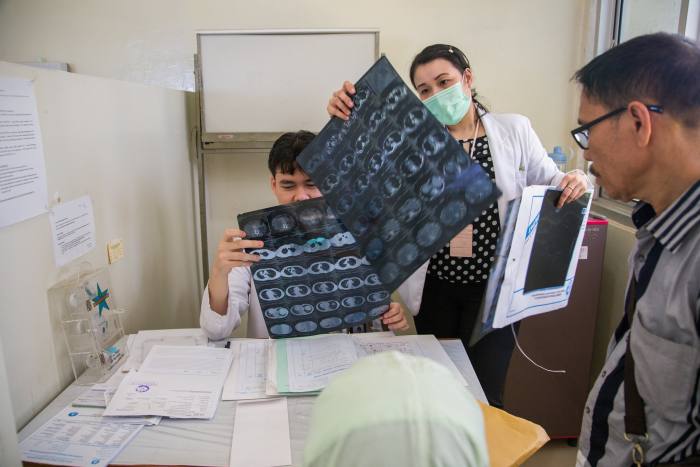Bill Gates and Wellcome Trust fund $550mn trial of first new TB vaccine for 100 years
Two leading medical charities will contribute about $550mn to fund a large-scale clinical trial of what would be the world’s first new tuberculosis vaccine for more than a century.
The vaccine, called M72, will be given from next year to 26,000 young adults in Africa and south-east Asia who have a latent infection with the bacteria that cause TB but no symptoms. The Bill & Melinda Gates Foundation will contribute $400mn to the phase 3 trial while Wellcome Trust provides $150mn.
In most years tuberculosis kills more people than any other infectious illness — an estimated 1.6mn deaths in 2021. Cases increased during the coronavirus pandemic, and the World Health Organization warned last year that drug-resistant strains were spreading.
Clear evidence about M72’s efficacy in preventing the emergence of active pulmonary tuberculosis will take several years to emerge from the trial, said Trevor Mundel, the Gates Foundation’s head of global health. A smaller phase 2 study with 3,500 people in southern Africa reported in 2018 that M72 was 54 per cent effective.
The WHO calculated that a vaccine 50 per cent effective at preventing the emergence of active disease could save between 4.6mn and 8.5mn lives by 2050.
“Of course we’d be happy with 90 per cent efficacy but from our modelling 50 per cent is good enough on the assumption that the durability is at least five years — and most of the vaccinologists who have looked at the data have said that is likely,” said Mundel.

A prototype M72 vaccine was first tested in humans in 2004 by Corixa, a US biotech company acquired the following year by GSK. The UK-based pharmaceutical group continued to develop M72, with funding from several aid agencies, before giving the Gates Foundation a non-exclusive licence to commercialise it in about 100 low- and middle-income countries.
GSK will continue to provide its AS01E adjuvant, which boosts the vaccine by stimulating the recipient’s immune system. The other critical ingredient of M72 is a “fusion protein” derived from the TB bacterium.
Alexander Pym, Wellcome’s head of infectious diseases, said it had taken so long to take M72 into a large-scale clinical trial partly because the pathogen’s complex lifecycle — lying dormant in the patient for years before symptoms appear — made it a difficult target for vaccine development and partly because of “market failure”.
“TB is the quintessential disease of poverty,” said Mundel. “Its incidence very much tracks poverty around the world. There’s no commercial market really for TB drugs, diagnostics or vaccines.”
Thomas Breuer, head of global health at GSK, agreed. His team runs the largest R&D programme aimed at tackling infectious diseases in the developing world “but in the end we are not an NGO. We are a publicly traded company,” he said, explaining the decision not to take the vaccine beyond phase 2 trials as a corporate project.
Community and activist groups welcomed the investment in the phase 3 trial. Mark Harrington, executive director of Treatment Action Group, said: “We hope this funding commitment sparks governments and other funders to substantially increase investments in the TB vaccine pipeline, which contains a number of promising candidates in addition to M72 but faces a dire financial shortfall.”
The only TB vaccine available today is BCG or Bacille Calmette-Guérin which was developed in France in the early 20th century by Albert Calmette and Camille Guérin from a weakened strain of bovine tuberculosis. It protects infants against severe systemic disease but offers little protection against pulmonary TB in adolescents and adults.
This story originally appeared on: Financial Times - Author:Clive Cookson




























